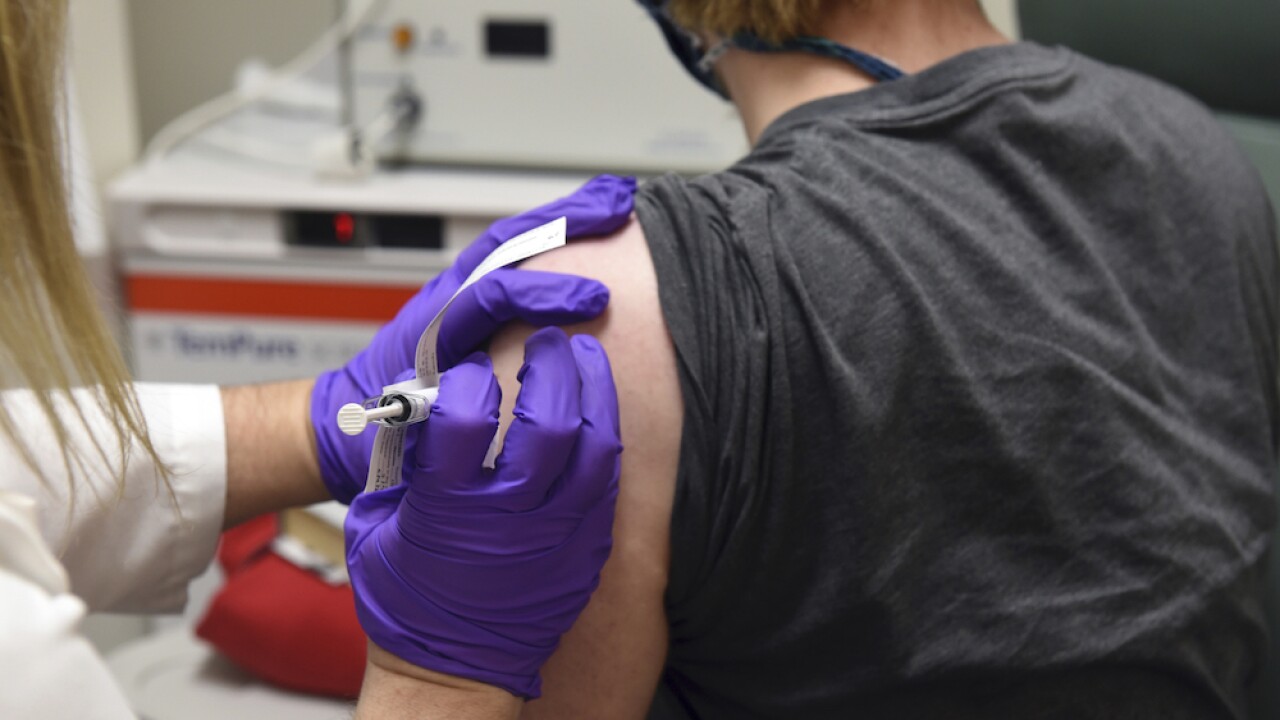NEW YORK (WKBW) — New York Governor Andrew Cuomo announced those who are in the COVID-19 vaccination groups 1A and 1B can begin making reservations to get the vaccine January 11.
Tuesday, it was announced NYS would accept new federal guidance opening up vaccines to everyone older than 65 and those who are immunocompromised as well.
A full list of eligible New Yorkers is available on the state's website here. You can also check your eligibility on the state's website here.
All vaccines will be provided by appointment only at this time. The state's COVID-19 vaccination hotline will open for scheduling vaccination appointments at 4 p.m. January 11 and can be reached at 1-833-697-4829.
Prior to receiving the vaccine you must complete the New York State COVID-19 Vaccine Form which can be found online here or you can fill out the form at your vaccination site. You will need proof of eligibility when you arrive at your vaccination site.
The state says health care workers will continue to be vaccinated at hospitals and other clinical settings. People age 65 and over will be primarily vaccinated at pharmacies and other sites. Public employees will primarily be vaccinated through their groups' health programs or as organized by their unions.
The governor said although the number of New Yorkers eligible to be vaccinated has increased, the number of doses of the COVID-19 vaccine the state receives from the federal government each week is not changing.
Officials say the state receives 300,000 doses of the vaccine each week, meaning it will take weeks to vaccinate those who are currently eligible. Previously, the state estimated it would take until April to vaccinate those in groups 1A and 1B.
You can find the full list of eligible New Yorkers as of January 12 from the state's website below.
Eligible New Yorkers in Phase 1a and 1b are:
- High-risk hospital workers (emergency room workers, ICU staff and Pulmonary Department staff)
- Residents and staff at nursing homes and other congregate care facilities
- Federally Qualified Health Center employees
- EMS workers
- Coroners, medical examiners and certain funeral workers
- Staff and residents at OPWDD, OMH and OASAS facilities
- Urgent Care providers
- Individuals administering COVID-19 vaccines, including local health department staff
- All Outpatient/Ambulatory front-line, high-risk health care workers of any age who provide direct in-person patient care
- All staff who are in direct contact with patients (i.e., intake staff)
- All front-line, high-risk public health workers who have direct contact with patients, including those conducting COVID-19 tests, handling COVID-19 specimens and COVID-19 vaccinations
- This includes, but is not limited to,
- Doctors who work in private medical practices and their staff
- Doctors who work in hospital-affiliated medical practices and their staff
- Doctors who work in public health clinics and their staff
- Registered Nurses
- Specialty medical practices of all types
- Dentists and Orthodontists and their staff
- Psychiatrists and Psychologists and their staff
- Physical Therapists and their staff
- Optometrists and their staff
- Pharmacists and Pharmacy Aides
- Home care workers
- Hospice workers
- Staff of nursing homes/skilled nursing facilities who did not receive COVID vaccination through the Pharmacy Partnership for Long-Term Care Program
Beginning January 11, 2021:
- Individuals Age 65 and older
- First Responders and Support Staff for First Responder Agencies
- Fire Service
- State Fire Service, including firefighters and investigators (professional and volunteer)
- Local Fire Services, including firefighters and investigators (professional and volunteer)
- Police and Investigators
- State Police, including Troopers
- State Park Police, DEC Police, Forest Rangers
- SUNY Police
- Sheriffs' Offices
- County Police Departments and Police Districts
- City, Town, and Village Police Departments
- Transit or other Public Authority Police Departments
- State Field Investigators, including Department of Motor Vehicles, State Commission of Correction, Justice Center, Department of Financial Services, Inspector General, Department of Tax and Finance, Office of Children and Family Services and State Liquor Authority
- Public Safety Communications
- Emergency Communication and Public Safety Answering Point Personnel, including dispatchers and technicians
- Other Sworn and Civilian Personnel
- Court Officers
- Other Police or Peace Officers
- Support of Civilian Staff for Any of the above services, agencies, or facilities
- Fire Service
- Corrections
- State Department of Corrections and Community Supervision Personnel, including correction and parole officers
- Local Correctional Facilities, including correction officers
- Local Probation Departments, including probation officers
- State Juvenile Detention and Rehabilitation Facilities
- Local Juvenile Detention and Rehabilitation Facilities
- P-12 Schools
- P-12 school or school district faculty or staff (includes all teachers, substitute teachers, student teachers, school administrators, paraprofessional staff and support staff including bus drivers)
- Contractors working in a P-12 school or school district (including contracted bus drivers)
- Licensed, registered, approved or legally exempt group Childcare Providers
- Employees or Support Staff of Licensed or Registered Childcare Setting
- Public Transit
- Airline and airport employees
- Passenger railroad employees
- Subway and mass transit employees (i.e., MTA, LIRR, Metro North, NYC Transit, Upstate transit)
- Ferry employees
- Port Authority employees
- Public bus employees
- Individuals living in a homeless shelter where sleeping, bathing or eating accommodations must be shared with individuals and families who are not part of the same household
- Individual working (paid or unpaid) in a homeless shelter where sleeping, bathing or eating accommodations must be shared by individuals and families who are not part of the same household, in a position where there is potential for interaction with shelter residents
- Public-facing grocery store workers
- In-person college instructors





